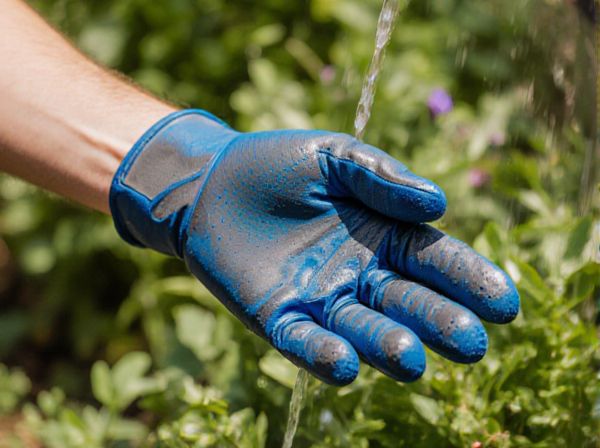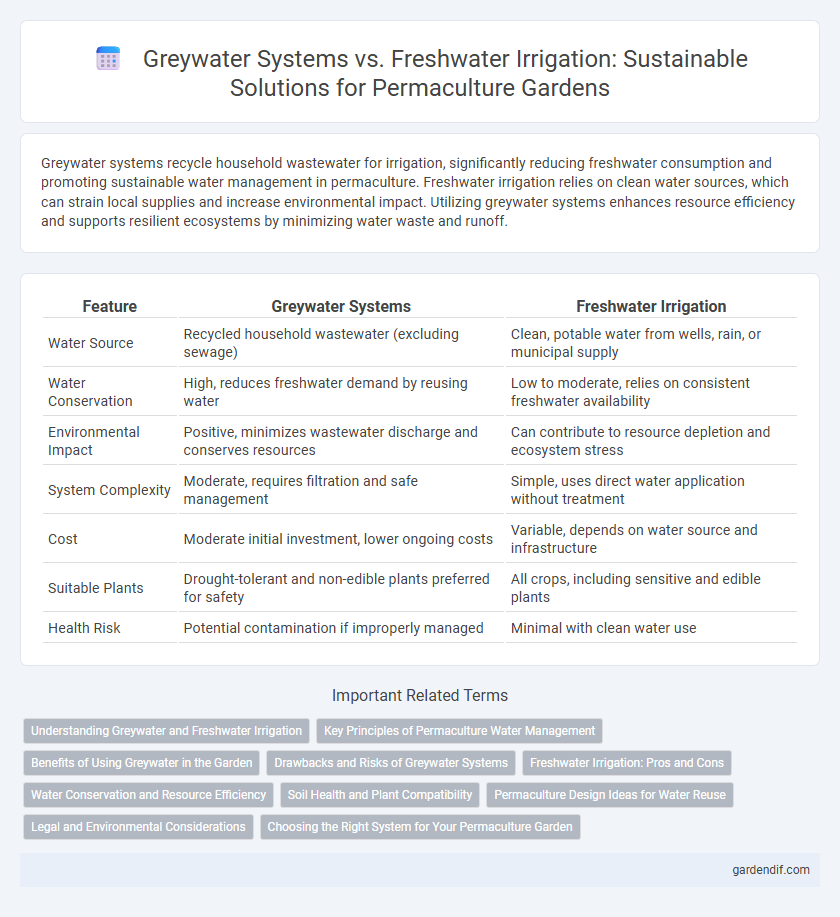
Greywater Systems vs Freshwater Irrigation Illustration
Greywater systems recycle household wastewater for irrigation, significantly reducing freshwater consumption and promoting sustainable water management in permaculture. Freshwater irrigation relies on clean water sources, which can strain local supplies and increase environmental impact. Utilizing greywater systems enhances resource efficiency and supports resilient ecosystems by minimizing water waste and runoff.
Table of Comparison
| Feature | Greywater Systems | Freshwater Irrigation |
|---|---|---|
| Water Source | Recycled household wastewater (excluding sewage) | Clean, potable water from wells, rain, or municipal supply |
| Water Conservation | High, reduces freshwater demand by reusing water | Low to moderate, relies on consistent freshwater availability |
| Environmental Impact | Positive, minimizes wastewater discharge and conserves resources | Can contribute to resource depletion and ecosystem stress |
| System Complexity | Moderate, requires filtration and safe management | Simple, uses direct water application without treatment |
| Cost | Moderate initial investment, lower ongoing costs | Variable, depends on water source and infrastructure |
| Suitable Plants | Drought-tolerant and non-edible plants preferred for safety | All crops, including sensitive and edible plants |
| Health Risk | Potential contamination if improperly managed | Minimal with clean water use |
Understanding Greywater and Freshwater Irrigation
Greywater systems recycle lightly used water from baths, sinks, and laundry to irrigate plants, significantly reducing freshwater consumption in permaculture gardens. Freshwater irrigation relies on untreated water from natural sources or municipal supplies, essential for crops requiring high water quality. Understanding the benefits and limitations of each method helps optimize water use efficiency and supports sustainable, resilient agricultural practices.
Key Principles of Permaculture Water Management
Greywater systems recycle gently used water from household activities, reducing freshwater consumption and promoting soil health through natural filtration and nutrient cycling. Freshwater irrigation relies on external water sources and often leads to over-extraction, soil degradation, and increased energy use. Permaculture water management prioritizes efficient water reuse, minimizing waste, enhancing local ecosystems, and creating resilient, self-sustaining water cycles.
Benefits of Using Greywater in the Garden
Using greywater in the garden reduces freshwater consumption by recycling lightly used water from sinks and showers, which conserves valuable potable water resources. It enriches soil moisture levels and supports plant growth by supplying nutrients such as phosphorus and nitrogen, often absent in regular irrigation water. Greywater systems also decrease water runoff and minimize pollution, contributing to sustainable permaculture garden practices that enhance ecosystem health.
Drawbacks and Risks of Greywater Systems
Greywater systems in permaculture pose risks such as potential pathogen contamination and soil salinity buildup, which can harm plant health and reduce soil fertility. Improper treatment or storage of greywater increases the chance of spreading bacteria and chemical pollutants, posing environmental and human health hazards. Compared to freshwater irrigation, greywater requires careful management to avoid clogging irrigation systems and prevent toxic accumulation in the ecosystem.
Freshwater Irrigation: Pros and Cons
Freshwater irrigation in permaculture provides a reliable water source, ensuring consistent plant hydration and supporting diverse crop growth. However, it often requires substantial water resources, which can lead to depletion of local aquifers and increased costs in water management. Efficient design and scheduling are crucial to minimize water waste and maintain soil health while maximizing agricultural productivity.
Water Conservation and Resource Efficiency
Greywater systems significantly enhance water conservation by recycling household wastewater for irrigation, reducing dependence on freshwater resources by up to 50%. These systems optimize resource efficiency through natural filtration and microbial breakdown, promoting soil health while minimizing nutrient runoff. Compared to freshwater irrigation, greywater irrigation offers sustainable water management that supports permaculture's ecological balance and long-term productivity.
Soil Health and Plant Compatibility
Greywater systems recycle household water for irrigation, reducing freshwater consumption and enhancing soil microbial activity by providing organic nutrients. Freshwater irrigation, though typically cleaner, can lead to nutrient leaching and soil structure degradation if overused. Choosing appropriate greywater treatments ensures plant compatibility by preventing chemical buildup and maintaining soil health within permaculture practices.
Permaculture Design Ideas for Water Reuse
Greywater systems in permaculture design enable effective water reuse by redirecting gently used water from sinks and showers to irrigate plants, reducing freshwater consumption significantly. Implementing biofiltration and plant-based filters within these systems enhances water quality, supporting sustainable garden ecosystems. Freshwater irrigation, though essential, benefits from integration with greywater systems to optimize resource efficiency and maintain soil health over time.
Legal and Environmental Considerations
Legal frameworks for greywater systems vary significantly by region, often requiring permits to ensure safe reuse and prevent contamination, unlike freshwater irrigation which is generally less regulated. Environmentally, greywater reuse reduces freshwater demand, minimizes wastewater discharge, and supports sustainable water cycles, while improper greywater management risks soil salinization and pathogen spread. Compliance with local regulations and proper treatment methods is crucial for maximizing the benefits of greywater systems in permaculture practices.
Choosing the Right System for Your Permaculture Garden
Selecting the ideal irrigation system for a permaculture garden depends on water availability, plant needs, and environmental impact. Greywater systems recycle household wastewater to conserve freshwater and support drought-resistant plants, improving water efficiency and soil health. Freshwater irrigation suits gardens with abundant clean water sources, ensuring optimal growth for water-intensive crops and maintaining ecosystem balance.
Greywater Systems vs Freshwater Irrigation Infographic

 gardendif.com
gardendif.com